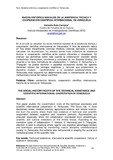Raíces histórico-sociales de la asistencia técnica y cooperación científica internacional en Venezuela

View/
Date
2012-07-02Author
Palabras Clave
Asistencia técnica, Cooperación científica internacional, Historia de la ciencia en VenezuelaTechnical assistance, International scientific cooperation, History of science in Venezuela
Metadata
Show full item recordAbstract
En el artículo se estudian las raíces histórico-sociales de la asistencia técnica y
cooperación científica internacional en Venezuela. El foco de atención radica
en tres áreas disciplinares: ciencias médicas, ciencias agrícolas y ciencias
naturales. Se reconstruyen los eventos donde hubo evidencia de asistencia
técnica y cooperación científica entre socios oferentes y receptores. Se
analizan las asimetrías sobre todo cuando la colaboración procedió desde
instituciones filantrópicas, científicas y culturales de los Estados Unidos. De
acuerdo a los tipos normativos de colaboración: 1. Vertical, 2. Horizontal y 3.
Triangular, se presta atención a aquellas situaciones donde los agentes
oferentes utilizan las ventajas cognitivas y técnicas que proporciona la
disciplina madura transfiriéndolas a la sociedad subdesarrollada. En
Venezuela, este esquema fue determinante para la conformación de la base
institucional y social del campo científico.
Collections
Información Adicional
| Otros Títulos | The social-history roots of the technical assistance and scientific international cooperation in Venezuela |
| Correo Electrónico | gruiz@ivic.gob.ve |
| ISSN | 2244-7008 |
| Resumen en otro Idioma | This paper studies the social-history roots of the technical assistance and scientific international cooperation in Venezuela. The focus lies in three disciplinary areas: medical science, agricultural science and natural science. Are built the events where there was evidence of technical and scientific cooperation between suppliers and receivers partners. Asymmetries are analyzed especially when the collaboration proceeded from philanthropic, scientific and cultural institutions of the United States. According to the normative types of collaboration: 1. Vertical, 2. Horizontal and 3. Triangular, attention is paid to situations where agents use cognitive advantages bidders and techniques provided by transferring mature discipline underdeveloped society. In Venezuela, this scheme was instrumental in shaping the social and institutional basis of the scientific field. |
| Colación | 40-56 |
| Periodicidad | semestral |
| Publicación Electrónica | Revista Bitácora-e |
| Sección | Revista Bitácora-e: Artículos |





